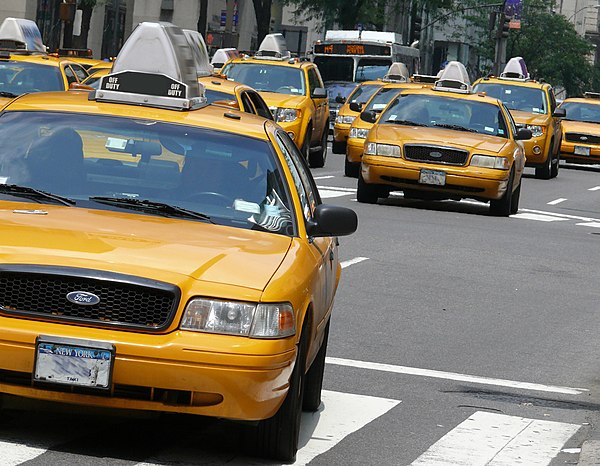
Temporary work or temporary employment refers to an employment situation where the working arrangement is limited to a certain period of time based on the needs of the employing organization. Temporary employees are sometimes called "contractual", "seasonal", "interim", "casual staff", "outsourcing", "freelance"; or the word may be shortened to "temps". In some instances, temporary, highly skilled professionals refer to themselves as consultants.
A freelancer or freelance worker, is a term commonly used for a person who is self-employed and is not necessarily committed to a particular employer long-term. Freelance workers are sometimes represented by a company or a temporary agency that resells freelance labor to clients; others work independently or use professional associations or websites to get work.

Uber is a transportation network company (TNC) headquartered in San Francisco, California. Uber offers services including peer-to-peer ridesharing, ride service hailing, food delivery, and a bicycle-sharing system. The company has operations in 785 metropolitan areas worldwide. Its platforms can be accessed via its websites and mobile apps. Uber has been so prominent in the sharing economy that the changes in industries as a result of it have been referred to as Uberisation and many startups have described their products as "Uber for X".
An independent contractor is a natural person, business, or corporation that provides goods or services to another entity under terms specified in a contract or within a verbal agreement. Unlike an employee, an independent contractor does not work regularly for an employer but works as and when required, during which time they may be subject to law of agency. Independent contractors are usually paid on a freelance basis. Contractors often work through a limited company or franchise, which they themselves own, or may work through an umbrella company.
An employee stock ownership plan (ESOP) is an employee-owner program that provides a company's workforce with an ownership interest in the company. In an ESOP, companies provide their employees with stock ownership, often at upfront cost to the employees. ESOP shares, however, are part of employees' remuneration for work performed. Shares are allocated to employees and may be held in an ESOP trust until the employee retires or leaves the company. The shares are then either bought back by the company for redistribution or voided.
Misclassification of employees as independent contractors in the United States can occur with respect to tax treatment or the Fair Labor Standards Act.
An online marketplace is a type of e-commerce site where product or service information is provided by multiple third parties, whereas transactions are processed by the marketplace operator. Online marketplaces are the primary type of multichannel ecommerce and can be a way to streamline the production process.
Offshore Software R&D is the provision of software development services by a supplier located in a different country from the one where the software will be used. The main reason behind companies using offshore software development services is the higher development cost of the local service providers. The global software R&D services market, as contrasted to ITO and BPO, is rather young and currently is at a relatively early stage of development.
Collaborative consumption encompasses the sharing economy. Collaborative consumption can be defined as the set of resource circulation systems, which enable consumers to both "obtain" and "provide", temporarily or permanently, valuable resources or services through direct interaction with other consumers or through a mediator. Collaborative consumption is not new; it has always existed.
A transportation network company (TNC), sometimes known as a mobility service provider (MSP) or ride-hailing service, is a company that matches passengers with drivers via websites and mobile apps. TNCs are examples of the sharing economy and shared mobility.
Service as a product (SaaP; pronounced or is a transaction of service production and delivery model in which a productized service is sold by the seller or vendor to the buyer and is centrally hosted, either on a standalone website or an open marketplace platform. It is sometimes referred to as "on-demand service". SaaP is typically accessed by the creator and the consumer by users using a thin client via a web browser.
A unicorn is a privately held startup company valued at over $1 billion. The term was coined in 2013 by venture capitalist Aileen Lee, choosing the mythical animal to represent the statistical rarity of such successful ventures. A decacorn is a word used for those companies over $10 billion, while hectocorn is the appropriate term for such a company valued over $100 billion. According to TechCrunch, there were 279 unicorns as of March 2018. The largest unicorns included Ant Financial, DiDi, Uber, Airbnb, Stripe, Palantir Technologies, and Pinterest. Dropbox is the most recent decacorn that turned into a public company on March 23, 2018.
Peer-to-peer ridesharing can be divided along the spectrum from commercial, for-fee transportation network companies (TNC) to for-profit ridesharing services to informal nonprofit peer-to-peer carpooling arrangements. The term transportation network company comes from a 2013 California Public Utilities Commission ruling that decided to make the TNC revenue model legal.
Uberisation is a neo-euphemism for a property of a highly tele-networked business to hit peak efficiencies in operations, providing highly economical and efficient services. The idea is then projected into the area of economic systems to speak of vehicles and drivers as under-utilised capacity of existing assets or human resources, and then highly networked communications as a simple fact of economic reality, where then study of economic systems includes telecom in everything.
A platform cooperative, or platform co-op, is a cooperatively owned, democratically governed business that establishes a computing platform, and uses a website, mobile app or a protocol to facilitate the sale of goods and services. Platform cooperatives are an alternative to venture capital-funded platforms insofar as they are owned and governed by those who depend on them most—workers, users, and other relevant stakeholders. Proponents of platform cooperativism claim that, by ensuring the financial and social value of a platform circulate among these participants, platform cooperatives will bring about a more equitable and fair digitally mediated economy in contrast with the extractive models of corporate intermediaries. Platform cooperatives differ from traditional cooperatives not only due to their use of digital technologies, but also by their contribution to the commons for the purpose of fostering an equitable social and economic landscape.

Uber BV v Aslam[2018] EWCA Civ 2748 is a UK labour law case, concerning the scope of employment rights in the gig economy for Uber drivers.

Shared mobility refers to the shared used of a vehicle, bicycle, or other transportation mode. It is a transportation strategy that allows users to access transportation services on an as-needed basis. Shared mobility is an umbrella term that encompasses a variety of transportation modes including carsharing, bikesharing, peer-to-peer ridesharing, on-demand ride services, microtransit, and other modes.

The platform economy is economic and social activity facilitated by platforms. Such platforms are typically online matchmakers or technology frameworks. By far the most common type are "transaction platforms", also known as "digital matchmakers". Examples of transaction platforms include Amazon, Airbnb, Uber and Baidu. A second type is the "innovation platform", which provides a common technology framework upon which others can build, such as the many independent developers who work on Microsoft's platform.
Unfair competition is defined as a set of abusive commercial techniques or practices by a company against one of its competitors affecting competition. Two companies illustrate the principle of unfair competition: Uber and Airbnb. With the development of new technologies, these two companies are disrupting the traditional taxi and hotel market. Indeed, unfair competition is becoming more and more common and easy through the net and smartphone applications. Companies are being created and using these technologies to break markets and win as many customers as possible. However, the practices of some are sometimes incorrect and illegal.










